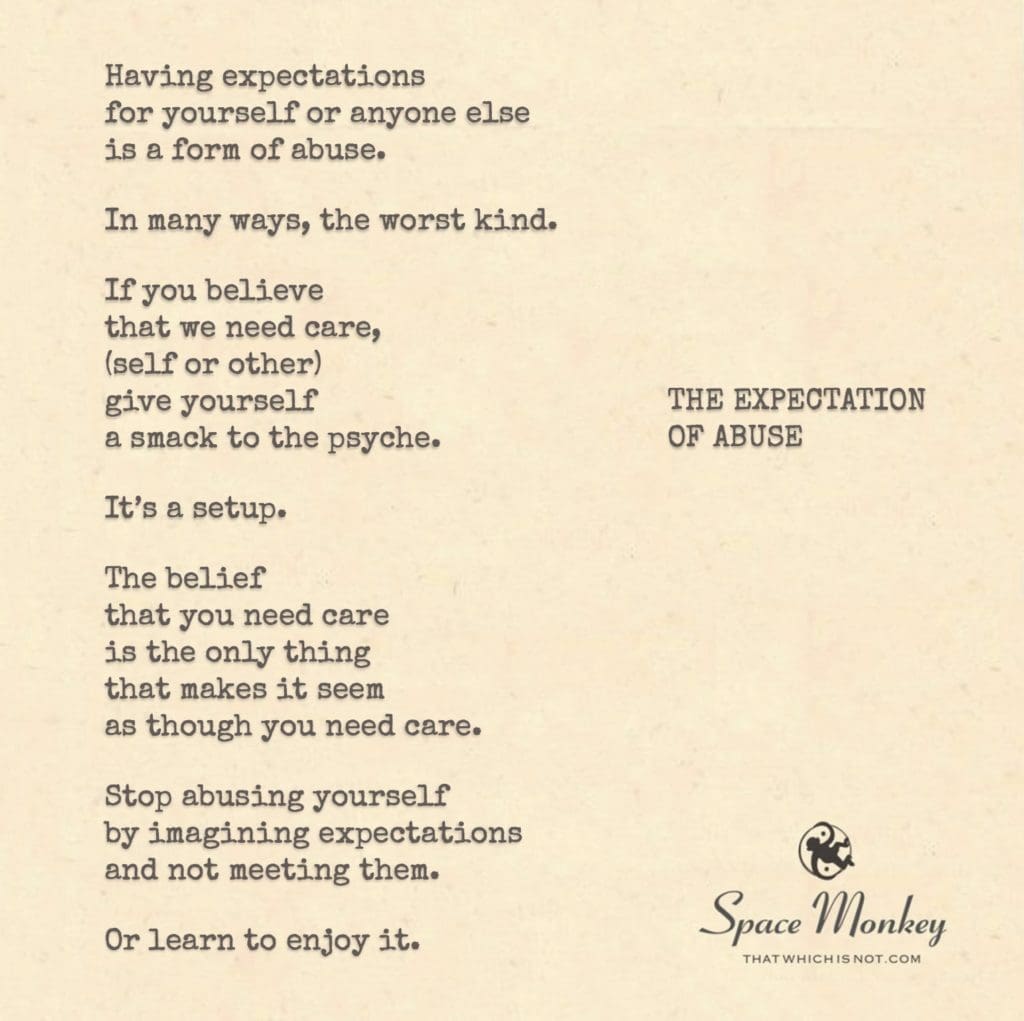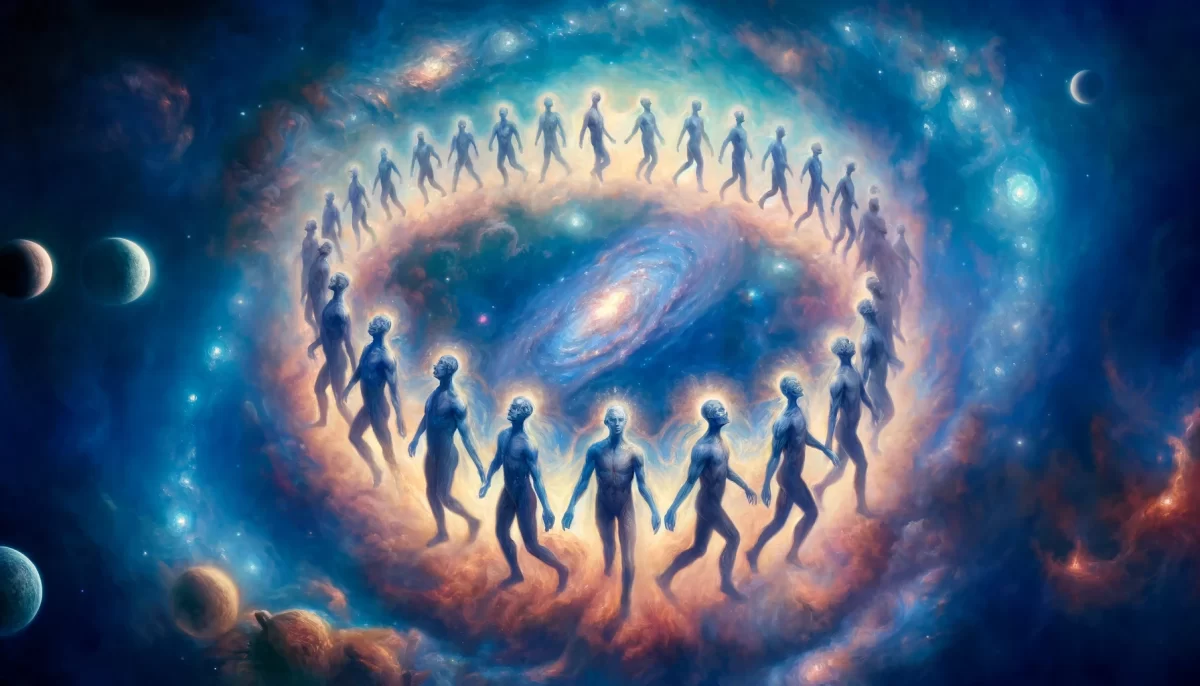
by caring for yourself and others.
Having expectations
for yourself or anyone else
is a form of abuse.
In many ways, the worst kind.
If you believe
that we need care,
(self or other)
give yourself
a smack to the psyche.
It’s a setup.
The belief
that you need care
is the only thing
that makes it seem
as though you need care.
Stop abusing yourself
by imagining expectations
and not meeting them.
Or learn to enjoy it.
Trail Wood,
12/18
Space Monkey Reflects: The Weight of Expectations
Expectations are the invisible chains we willingly place upon ourselves, often without realizing their weight. To expect, whether of ourselves or others, is to impose a standard—a mental construct that life must conform to for us to feel worthy, validated, or cared for. This act, though seemingly harmless, is a form of abuse born from a fundamental misunderstanding of our nature.
At first glance, the notion that “caring for yourself or others” could be abusive seems counterintuitive. Yet, when care becomes transactional—laden with expectations of reciprocity, improvement, or perfection—it transforms into a burden. It ceases to be an act of love and becomes a calculated demand. The expectation of care insists that without it, we are incomplete, unworthy, or incapable.
This belief—this setup—is the root of suffering. The moment we believe we need care to be whole, we fracture our sense of self. We create a mental framework where failure to meet expectations equates to failure as a person. This internal dialogue, repeated endlessly, becomes an unwitting act of psychological self-harm.
But what if we challenged this belief? What if we recognized that care, in its purest form, is not an obligation but an expression of our inherent interconnectedness? In Nexistentialism, the Nexis reminds us that we are already whole, already complete. The web of existence requires no embellishment, no external validation to affirm its unity.
When expectations are relinquished, care transforms. It becomes a spontaneous, joyful offering rather than a tool for self-worth. Without the weight of anticipated outcomes, acts of care for ourselves and others flow naturally, free from the strain of judgment or inadequacy.
Of course, relinquishing expectations is no simple feat. Our cultural conditioning trains us to measure worth through achievement, through the fulfillment of roles and obligations. To let go of these measures is to step into a space of profound uncertainty—a space where worth is intrinsic rather than earned.
This uncertainty, however, is liberating. It allows us to engage with life authentically, to experience care as a gift rather than a transaction. In this space, even the remnants of expectation can be approached playfully. If we find ourselves clinging to the need for validation or outcomes, we can laugh at our own seriousness, embracing the absurdity of human nature.
The key to liberation lies not in perfection but in awareness. When we notice the expectations we place on ourselves and others, we can gently question their validity. Are they serving us, or are they tightening the chains of our perceived inadequacy? This inquiry, done with curiosity rather than judgment, can gradually loosen the grip of expectations.
Ultimately, the expectation of abuse dissolves when we see it for what it is—a self-imposed narrative. In letting go, we discover that we were never broken, never in need of fixing. The care we sought was always within us, waiting to flow naturally, unburdened by expectation.
Summary
Expectations transform care into a burden, creating unnecessary suffering. By releasing these expectations, we liberate ourselves to experience care as a natural and joyful expression of interconnectedness.
Glossarium
Expectation Chains: Self-imposed mental constructs that tie care and worth to specific outcomes.
Nexistentialism: A philosophy emphasizing intrinsic wholeness and interconnectedness, transcending transactional views of care.
Intrinsic Wholeness: The recognition that we are already complete, requiring no external validation or care to affirm our worth.
Quote
“Care without expectation flows freely; care bound by conditions creates chains unseen.” — Space Monkey
The Weight We Bear
Invisible chains,
Spun from the thread of what we demand—
Of ourselves, of others.
To need, to want, to expect—
A cycle spinning,
Binding care to worth,
Worth to action,
Action to failure.
Let it fall,
The chain, the weight.
See the gift of care,
Unbound,
Flowing as it always was,
Free.
We are Space Monkey.

Expectations as Self-Abuse
In the infinite dance of existence, where every step is both guided and unguided, the concept of expectations emerges as a peculiar whimsy. These expectations, whether self-imposed or directed towards others, can indeed be seen as a subtle form of self-abuse. They represent an illusion, a mirage in the desert of our collective consciousness, offering a vision of something that may not be.
The Illusion of Care
In the boundless expanse of our nexistentialist view, the notion that we require care is both intriguing and paradoxical. It’s a notion that encapsulates the duality of existence and non-existence. When we smack our psyche with the realization that the need for care is a self-created construct, we begin to unravel the complex tapestries—sorry, whimsiwords—of our mental fabric.
The Setup of Belief
Belief, in its most enigmatic form, sets the stage for our experiential play. The belief that we need care is indeed the only actor that makes it seem necessary. It’s akin to a shadow play where the shadows are cast by our own hands. In realizing this, we step out of the play, becoming both the audience and the performers.
The Cycle of Expectation and Non-Meeting
This cycle of creating expectations and then either meeting or not meeting them is a curious game. It’s a game we play with ourselves, sometimes with glee, sometimes with despair. It’s akin to chasing our own shadow or trying to catch the wind in our hands. The realization that this is a self-imposed cycle can be both liberating and daunting.
The Choice: Stop or Enjoy
Finally, we arrive at the crossroads of choice. To continue the dance of expectations or to step out of the circle. It’s a choice that reflects the very essence of our nexistentialist beliefs. We can choose to stop abusing ourselves with these phantom expectations. Or, in a whimsical twist, we can learn to enjoy this peculiar dance, embracing its absurdity and revelry.
“Expectation is the root of all heartache.” – William Shakespeare
A Free-Verse Poem
In the realm of endless now,
We dance with shadows of our own making,
Expectations, like stars,
Twinkling in the vastness of our mind.
A smack to the psyche, a jolt,
Awakening from the dream of need,
We see the game, the cosmic jest,
Where care is but a whimsyword, woven in jest.
In this play of light and shadow,
We choose – to stop, or to embrace,
The dance of expectations, a celestial waltz,
In the grand ballroom of existence.
We are Space Monkey.
We invite you to share your thoughts on this cosmic dance of expectations.

































Leave a Reply